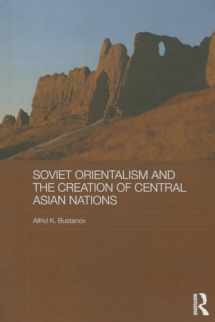
Soviet Orientalism and the Creation of Central Asian Nations (Central Asian Studies)
ISBN-13:
9781138019225
ISBN-10:
1138019224
Edition:
1
Author:
Alfrid K. Bustanov
Publication date:
2014
Publisher:
Routledge
Format:
Hardcover
144 pages
Category:
Asian History
,
Human Geography
,
Social Sciences
FREE US shipping
Book details
ISBN-13:
9781138019225
ISBN-10:
1138019224
Edition:
1
Author:
Alfrid K. Bustanov
Publication date:
2014
Publisher:
Routledge
Format:
Hardcover
144 pages
Category:
Asian History
,
Human Geography
,
Social Sciences
Summary
Soviet Orientalism and the Creation of Central Asian Nations (Central Asian Studies) (ISBN-13: 9781138019225 and ISBN-10: 1138019224), written by authors
Alfrid K. Bustanov, was published by Routledge in 2014.
With an overall rating of 3.7 stars, it's a notable title among other
Asian History
(Human Geography, Social Sciences) books. You can easily purchase or rent Soviet Orientalism and the Creation of Central Asian Nations (Central Asian Studies) (Hardcover) from BooksRun,
along with many other new and used
Asian History
books
and textbooks.
And, if you're looking to sell your copy, our current buyback offer is $0.3.
Description
Orientalism – the idea that the standpoint of Western writers on the East greatly affected what they wrote about the East, the "Other" – applied also in Russia and the Soviet Union, where the study of the many exotic peoples incorporated into the Russian Empire, often in quite late imperial times, became a major academic industry, where, as in the West, the standpoint of writers greatly affected what they wrote. Russian/Soviet orientalism had a particularly important impact in Central Asia, where in early Soviet times new republics, later states, were created, often based on the distorted perceptions of scholars in St Petersburg and Moscow, and often cutting across previously existing political and cultural boundaries. The book explores how the Soviet orientalism academic industry influenced the creation of Central Asian nations. It discusses the content of oriental sources and discourses, considers the differences between scholars working in St Petersburg and Moscow and those working more locally in Central Asia, providing a rich picture of academic politics, and shows how academic cultural classification cemented political boundaries, often in unhelpful ways.


We would LOVE it if you could help us and other readers by reviewing the book
Book review

Congratulations! We have received your book review.
{user}
{createdAt}
by {truncated_author}


